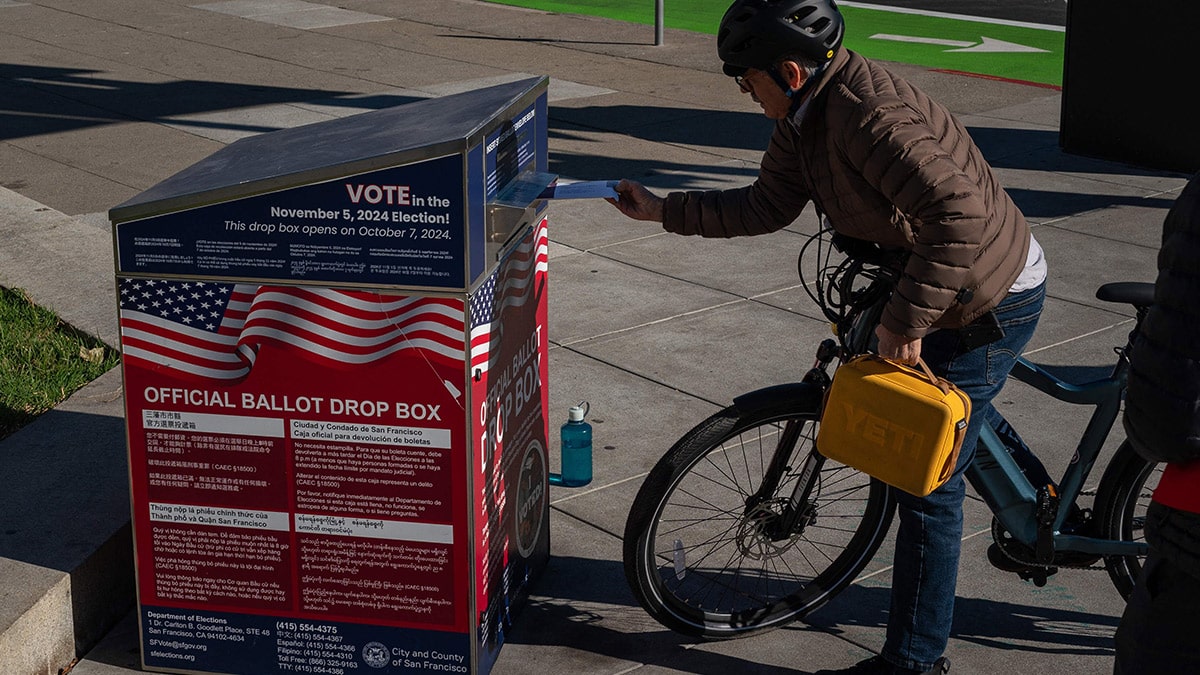2.14M Fil-Am voters crucial in battleground states

DECISION TIME A voter in San Francisco, California, drops off ballots on Nov. 4, the final day of early voting ahead of Election Day. —Agence France-Presse
PHILADELPHIA, Pennsylvania — Over 160 million Americans will be choosing between Vice President Kamala Harris and former US President Donald Trump to be their 47th president today, in a high-stakes election seen to have far-reaching implications in the Philippines, its oldest treaty ally in Asia.
This year, the Filipino American vote—at 2.14 million eligible voters as of 2024—will be a key electorate, especially with Harris and Trump still neck and neck in battleground states.
Platforms on inflation, migrant workers’ rights, and health care are among the most important issues for Fil-Ams in this election, according to Karen Roxas, national vice president of the National Alliance for Filipino Concerns, and Nina Macapinlac, secretary general of the Bagong Alyansang Makabayan-USA Northeast.
READ: How the US elections will impact the Philippines
Both groups are involved in the “Filipino American Agenda,” which seeks to identify the concerns and demands of the Filipino diaspora population in the United States. Among others, they found that Filipinos are worried about the lack of social protections, high costs of housing, education, health care, and hate crimes.
“People are also struggling here in the US, especially working-class Filipino migrants and Filipinos who were born here. A lot of our kababayan are also undocumented and so they are especially nervous about the … conditions that the immigrants will face in the next administration, especially because Trump is very explicit about his anti-immigrant rhetoric,” Macapinlac said.
Migrants as scapegoats
“And then we know that a lot of our kababayan also face trafficking [and] wage theft when they get here. So they will really be affected by what type of administration we have. Will we have an administration that is really there for and can enforce justice and accountability for our kababayan who are facing immigration issues, or are they actually going to scapegoat more migrants?” echoed Roxas.
Even now, some Filipinos have already fallen into the dragnet such as the case of two nursing assistants, Dhenmark and Jovi, who were arrested and charged with aggravated assault of a patient despite acting in self-defense against someone with a history of aggressive behavior.
Macapinlac said their case best illustrates how Filipino migrant workers are often “scapegoated as criminals and blamed for the economic crisis” America is experiencing.
Beyond the US borders, the election also signals a “game-changing period for America if it could sustain its global leadership as the sole superpower,” said Chester Cabalza, founding president of the Manila-based think tank International Development and Security Cooperation.
This as other countries, particularly China, jockey to pin down Washington’s stature as the world’s No. 1 superpower.
Cabalza said the US election would also affect the Philippines’ economic and security dependence on Washington. Economy-wise, the United States is the Philippines’ third largest trading partner and top export market, with trade amounting to $36.1 million in 2022.
The China factor
On the security side, Manila and Washington have a 1951 mutual defense treaty stating that an armed attack against either party in the Pacific would compel the other to meet the common danger.
Cabalza said Harris is anticipated to continue President Joseph Biden’s foreign policy of strengthening ties with US allies and countering China’s expanding influence, particularly in the Indo-Pacific region.
Last year, Harris visited Palawan—a neighboring island to the disputed Spratlys Islands—in a bid to show solidarity with the Philippines amid its ongoing territorial disputes with an increasingly aggressive China.
In contrast, Trump’s “unpredictable and pragmatic governance will test America’s resiliency as he will equal his leadership with revisionist leaders like Xi Jinping of China, Vladimir Putin of Russia, and Narendra Modi of India,” Cabalza said.
For Macapinlac, however, both candidates’ foreign policies are virtually no different from each other as both still seek to assert US global dominance. “The US is not acting in good faith, even if it claims to be defending the Filipino peoples’ sovereignty. So that’s really a big concern for us,” she said.
For now, their groups are working to better empower Filipino communities so that “they are the ones who enact the changes they want to see,” Roxas said. “We’re also hoping that the work won’t stop, you know, regardless of who gets elected, and for the Filipino people to be moved into action to actually also see the changes they want in their communities.”
“Another way we want to prepare the Filipino community is really to encourage Filipinos to get organized, to build their own organizations where they can have these conversations, they can conduct this type of education with the community and build unity across our people because building organization is our best defense,” Macapinlac said.